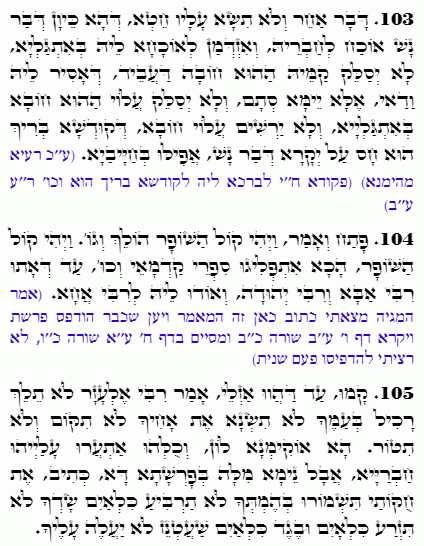Daily Zohar # 4608 – Kedoshim – A garment of mixed linen and wool shall not come upon you
Daily Zohar 4608

Hebrew translation:
104. פָּתַח וְאָמַר, וַיְהִי קוֹל הַשֹּׁפָר הוֹלֵךְ וְגוֹ’. וַיְהִי קוֹל הַשֹּׁפָר, כָּאן נֶחְלְקוּ סִפְרֵי הַקַּדְמוֹנִים וְכוּ’, עַד שֶׁבָּאוּ רַבִּי אַבָּא וְרַבִּי יְהוּדָה, וְהוֹדוּ לְרַבִּי אָחָא.
105. קָמוּ. עַד שֶׁהָיוּ הוֹלְכִים, אָמַר רַבִּי אֶלְעָזָר, לֹא תֵלֵךְ רָכִיל בְּעַמֶּיךָ, לֹא תִשְׂנָא אֶת אָחִיךָ, לֹא תִקֹּם וְלֹא תִטֹּר. הֲרֵי בֵּאַרְנוּ אוֹתָם, וְכֻלָּם הִתְעוֹרְרוּ עֲלֵיהֶם הַחֲבֵרִים. אֲבָל נֶאֱמַר דָּבָר בַּפָּרָשָׁה הַזּוֹ. כָּתוּב אֶת חֻקֹּתַי תִּשְׁמֹרוּ, בְּהֶמְתְּךָ לֹא תַרְבִּיעַ כִּלְאַיִם, שָׂדְךָ לֹא תִזְרַע כִּלְאָיִם, וּבֶגֶד כִּלְאַיִם שַׁעַטְנֵז לֹא יַעֲלֶה עָלֶיךָ.
.
Zohar Kedoshim
Continued from previous DZ
#103
Another interpretation of “and you shall not bear sin because of him” (Leviticus 19:17): If a person rebukes his friend and it happens that he needs to rebuke him openly, he should not mention the specific sin that his friend committed. This is definitely forbidden. Instead, he should speak in general terms and not mention the particular time or instance of the sin openly, nor should he mark the sin upon him. This is because the Holy One, Blessed be He, is compassionate about the honor of every person, even of the wicked.
Notes:
When rebuking someone publicly, it is essential to avoid mentioning specific sins. The rebuke should be general to avoid shaming the individual. Public rebuke should be handled with sensitivity and respect, aligning with the compassionate attribute of the Holy One, Blessed be He.
#104
Rabbi Acha opened and said,
Exodus 19:19
“וַיְהִי קוֹל הַשּׁוֹפָר הוֹלֵךְ וְחָזֵק מְאֹד מֹשֶׁה יְדַבֵּר וְהָאֱלֹהִים יַעֲנֶנּוּ בְקוֹל.”
“And it was, as the sound of the trumpet grew louder and louder, Moses speaks, and God answers him by a voice.”
(This passage has already been printed in the section of Vayikra, from #85 to #109), until Rabbi Abba and Rabbi Yehuda came and thanked Rabbi Acha. The conclusion of the discourse, which is missing there, is provided here.
#105
As they were walking, Rabbi Abba, Rabbi Acha, and Rabbi Yehuda (as mentioned earlier) rose. While walking, Rabbi Elazar quotes Leviticus 19:16-18, “Do not go about as a talebearer among your people; you shall not hate your brother in your heart; you shall not take vengeance or bear a grudge against your people.” This has already been explained, and all the friends understood it. However, let us add something about this portion. It is written,
Leviticus 19:19
“אֶת חֻקֹּתַי תִּשְׁמֹרוּ בְּהֶמְתְּךָ לֹא תַרְבִּיעַ כִּלְאַיִם שָׂדְךָ לֹא תִזְרַע כִּלְאָיִם וּבֶגֶד כִּלְאַיִם שַׁעַטְנֵז לֹא יַעֲלֶה עָלֶיךָ.”
“‘You shall keep My statutes. You shall not let your livestock breed with another kind. You shall not sow your field with mixed seed. Nor shall a garment of mixed linen and wool come upon you.”
Lesson;
According to the Holy Ari, the prohibition against breeding different kinds of livestock is about maintaining the distinctness of their spiritual energies and preventing the spiritual confusion and imbalance that could result from improper mixtures that affect the Tikun process. This commandment underscores the importance of the divine order and the unique role of each creation within that order.
The Holy Ari explains the prohibition against wearing garments made of mixed linen and wool (שַׁעַטְנֵז). Mixing wool and linen represents blending spiritual forces from animals and vegetation. They should remain distinct.
The wool comes from sheep, which is associated with the right side of Chessed, and linen comes from flax, associated with the left side of Gevurah. Mixing these two materials represents a blending of Chessed and Gevurah in a manner that is not permissible. Each material has its own spiritual energy, and combining them improperly can disrupt the balance of these energies.
The Ari teaches that maintaining the separation of wool and linen in garments reflects the broader principle of keeping distinct energies and forces in their proper places. This helps to maintain the harmony and balance of the spiritual worlds, ensuring that the Light flows in the correct channels without interference.
By observing the commandment against wearing שַׁעַטְנֵז (shaatnez), individuals align themselves and contribute to spiritual balance. This alignment is essential for drawing down blessings and ensuring that the spiritual and physical worlds function according to Hashem’s will.
The prohibition of shaatnez is not merely a physical commandment but also a profound spiritual practice that upholds the integrity of the world of Tikun.
{||}

 Previous: Kedoshim
Previous: Kedoshim

